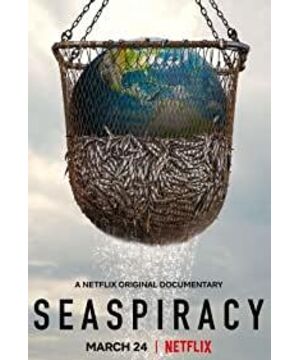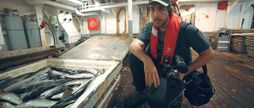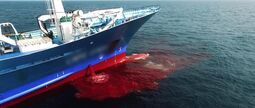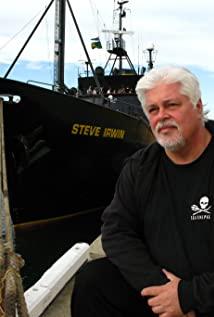For humans, seafood has a higher nutritional value than terrestrial animals. The ocean not only gave birth to life, but also provided us with an endless supply of precious ingredients until...
Human plastic waste and industrial raw materials have polluted the ocean, causing a large number of marine animals to face a survival crisis.
This is what the textbook teaches us.
Once upon a time, I believed that reducing the discharge of man-made garbage into the ocean is an effective means to protect the marine environment, but recently some people have sang against this view.
After reading it, I was not only dumbfounded, but also shocked.
Director Ali Tarez is a guy from England. He loves animal documentaries and has a soft spot for the sea since he was a child.
At the age of 22, Ali, who was in college, originally planned to shoot a documentary depicting the mysteries of the sea, but as the shooting progressed, he slowly discovered that the sea in reality is different from what he imagined.
During the period, he saw a local report about humans finding large amounts of plastic compounds in the stomachs of stranded whales.
This kind of seeming harm to animals actually punishes humans in a disguised form.
We all know that plastic is a kind of hard-to-degrade substance, but hard-to-degrade does not mean that it cannot be decomposed. With the wind and sun on the sea, they will eventually decompose into plastic particles.
Now, the number of such plastic particles is 500 times more than the number of celestial bodies in the Milky Way . Such a large amount of particles are ingested by marine organisms, and the last thing that enters is the human table.
Realizing the seriousness of the problem, Ali decided to join the Marine Conservation Organization and picked up plastic garbage on the beach.
For the sake of environmental protection, he even replaced all plastic products in his life with more durable materials.
But there is so much plastic garbage on the beach, and Ali's contribution is only a drop in the bucket.
Just as he was thinking about how to further improve the marine environment, a piece of news from Japan inspired him.
This is a report about Japanese fishermen withdrawing from the International Whaling Commission and restarting commercial whaling.
Whales were once an endangered protected animal. With the issuance of the global ban in the 1980s, the number of this species has rebounded.
Japan’s unilateral ignorance of the international law of the sea and unauthorized fishing is undoubtedly a second-degree destruction of the marine ecological balance.
In order to expose the Japanese government's reckless face, Ali and his like-minded friends decided to go deep into Japan's notorious cetacean slaughterhouse- Taiji Town .
01
Fishing, the beginning of destruction
Regarding Taiji Town, Western media has reported on it more than once. In 2009, another American director did a follow-up filming. The famous " Dolphin Bay " came from him.
Because of the detailed and cruel image data, the film once won the 82nd Academy Awards for Best Documentary Feature Film .
For the filming of Taiji Town, Ali was followed by the local police and even under surveillance 24 hours a day.
He even found the parties in "Dolphin Bay" and talked about the status quo of the terrible news blockade in Taiji Town.
However, after many years, Ali still couldn't change anything, and could only witness the recurrence of the familiar tragedy.
More sadly, he learned from industry sources that dolphin meat is not actually sold for money, and the fishing reasons given by the Japanese government ("prevention of pests") are just an ambush for local overfishing.
According to clues given by insiders, Ali made new discoveries during his trip to Taiji Town.
He noticed that in addition to hunting dolphins and whales in Taiji Town, there are also a large number of tuna catches .
If dolphin meat has become a burden to the fishing industry due to lack of commercial value, then tuna is a real profit.
Taking bluefin tuna as an example, according to estimates, each bluefin tuna can earn more than three million U.S. dollars in income at the Tokyo fish market.
The profit-seeking fishing of enterprises is an important reason that triggers them to quickly move to the brink of extinction.
It's not just tuna, but sharks that suffer .
In fact, public service advertisements on reducing shark fin consumption in the Mainland have been done for many years, and the ad slogan " No sale, no killing " has long been popular.
However, in Hong Kong and Macau, as a status symbol, there is no food with much nutritional value. The local consumption habits of shark fin have not improved so far.
Just walk around, whether it’s a restaurant or dry goods, shark fin is still a regular source of stock in the store.
As we all know, sharks play a very important role in the health of the marine environment.
At the top of the marine food chain, sharks not only help maintain the health of marine populations, but also indirectly affect the stability of coral reefs.
The reduction of sharks will directly affect the supply-demand relationship of the food chain, thus triggering the butterfly effect and forming a vicious circle.
Now, the number of this population is disappearing from the earth at least 50 million a year .
Similar to Taijicho dolphins, these sharks do not have enough commercial value. The reason why they die at such a large rate is still due to human overfishing.
There are many ways of human fishing in the ocean, among which trawling fishing with undifferentiated fishing is the most destructive.
This fishing net can swallow up to a church, deep enough to reach the shallow seabed. The consequence is that no grass grows in the ocean where the fishing net passes .
If you still have no idea about this fishing phenomenon, then use another example to let you understand its destructive power.
Try to imagine the fishing net as a tractor in the water. Now, wherever it goes, it razes the vibrant seabed to the ground. Various corals and algae plants on the seabed provide 3/4 of the oxygen to the earth, which is far greater than that of terrestrial forests.
How many forests are shoveled on the earth every year? 25 million acres is equivalent to removing 27 football fields per minute .
How many "marine forests" are uprooted due to human fishing? 3.9 billion acres is equivalent to removing 4,316 football fields per minute .
If you have no idea about the stadium area, put it another way, this area is approximately equal to that of Greenland, Norway, Sweden, Finland, Denmark, Britain, Germany, France, Spain, Portugal, Italy, Turkey, Iran, Thailand and Australia. The sum of land .
Under such a large-scale fishing, the shark is obviously inevitable, so it can only be forced to become a victim of human fishing.
How many victims of this kind are there in France?
Take dolphins, for example, more than 10,000 dolphins are accidentally caught every year, which is 10 times that of Taiji Town .
Seeing this, the answer is already very clear.
Compared with the pollution of plastics to the marine environment, human overfishing poses a greater threat to marine life.
The question is, can people change the habit of eating fish?
If not, is there a way to create a more environmentally friendly way of eating?
02
Environmental protection, the emperor's new clothes
If you go to the supermarket to buy canned seafood, you will see a blue label on the surface of the can.
This is a sustainable fishing label issued by the Marine Stewardship Council , which means that the labeled products are obtained through sustainable development.
However, there are as many as 4.6 million commercial fishing vessels worldwide. Can this organization really guarantee that the fish caught by each fishing vessel are "clean"?
Of course not.
Some non-governmental marine protection organizations broke the news, and some labeling companies under the so-called "safe production" have had a high rate of accidental arrest.
In order to verify this statement, Ali went to the organization that issued the label to ask what happened.
But I got this answer:
Here comes the question. If the internationally certified seafood label does not have credibility, why should the label be affixed in the first place?
In addition, since various marine environmental protection organizations have claimed that plastic is the cause of the deterioration of marine ecology, why do they avoid discussing the source of plastic?
In fact, a lot of plastic waste does not come from our daily lives, but from the fishing industry.
At present, among the plastic garbage dumps scattered in the world's oceans, fishery waste alone accounts for 46%, and the plastic pipes we frequently use account for only 0.03% of them .
Why don't environmental organizations make such important information public?
After all, it's still a question of "money".
Simply put, this type of environmental protection organization and the company responsible for OEM, as well as the fishery company, are the same. One is responsible for misleading consumers, one is responsible for OEM, and the other is responsible for production .
Corruption is prone to occur in this closed-loop structure, so it is prone to the above-mentioned ridiculous situation of "ineffective supervision, but the world is too difficult".
The lack of supervision caused by human negligence has made Dayang a public fishing ground for hunting in various countries.
The areas that should have been supervised have not been properly protected. Sustainable development and the symbolic label have also become a fake self-deception because of the concealment of the environmental protection group.
The only function of this type of label is to help related companies win a good public relations image in mass marketing.
Using people's love for animals, they created an image that pretended to care about marine life, but behind their backs they followed the crude logic of "I would rather kill a thousand by mistake than let go of one", and slowly hollowed out the ocean.
The discussion on " Should we stop fishing for the sake of marine animals " has thus far become futile. Because first, you cannot guarantee that everyone will not eat fish, and secondly, the profiteering nature of the fishery determines that it cannot stop the already open blood basin.
As long as the interest chain still exists, discussions on this topic will still remain at the theoretical and moral level.
03
Accomplices & Victims
As the investigation progressed, director Ali quickly discovered that one of the founders of the Marine Management Committee that issued the environmental label ran a large seafood retailer.
And this organization (Marine Management Committee) uses 2/3 of its budget for OEM every year, and the more it posts, the higher the income.
In order to ensure that the Maritime Management Committee can effectively produce sustainable seafood in accordance with the regulations, the government has sent observers to accompany the fleet to conduct sea inspections.
As a result, some of them either took bribes and chose to close one eye, or they were murdered by the crew because they adhered to the principle, and then abandoned to the sea .
Observers are just one of many victims in the fishery interest chain. Some crew members were forced to become slaves to local interest groups because they were poor and could only work in fisheries for a living.
They live on the sea for a long time, relying on high-intensity work in exchange for salary to make a living, and the working environment is very bad.
In some economically underdeveloped areas, similar criminal activities have been repeatedly prohibited.
Other civilians who make a living by fishing are facing the predicament of having a lot of money because of the cross-border fishing of commercial fleets.
Those who can't eat enough, either choose to go farther, but the sea conditions are more dangerous high seas to fish, or they can only jump over the wall and choose to stay alive as pirates.
A seemingly simple fishing industry involves all kinds of problems behind it, until it affects humans and goes around, it is nothing more than profits .
Someone may suggest that since seafood is indispensable, humans will not create so many problems in their own captivity.
Is it true?
According to the survey, you will find that this type of mariculture not only proves that artificial breeding is not healthier than natural salvage, but it also breeds a series of problems such as cross-infection, harsh breeding environment, and secondary pollution.
To solve the various problems presented in the film, I went back to the problem just mentioned.
Can we guarantee not to eat fish? In other words, can we guarantee that industrialized fishing will not be carried out?
Obviously, this question cannot be answered clearly in one sentence, because you and I cannot represent others, and there are as many as 7.26231 million "bystanders" on this planet.
Emerson once said: No matter how elegant the slaughterhouse hides the meal you have just eaten several kilometers away, you are still an accomplice .
But as another whaler said, slaughtering a whale does not make him worse than a person who slaughtered two thousand chickens, because the meat of the two is the same .
To solve this contradiction, perhaps you only need to stare at the dying animal once, and their eyes will not lie.
And you yourself will get the answer through this gaze.
Author|Zed
Planning|Light Years Power
-End-
View more about Seaspiracy reviews











